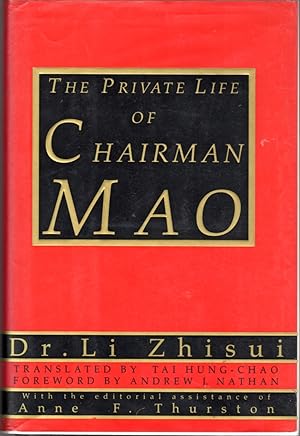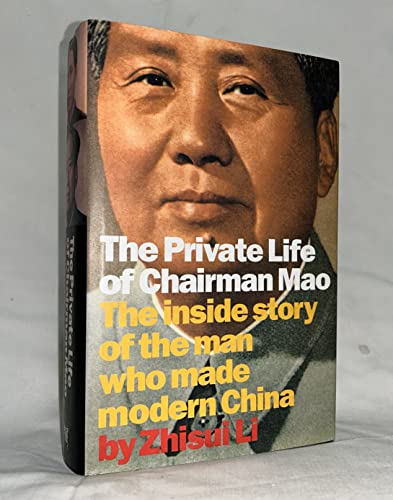Zhisui Editorial Assistance Anne Thurston (3 results)
Product Type
- All Product Types
- Books (3)
- Magazines & Periodicals
- Comics
- Sheet Music
- Art, Prints & Posters
- Photographs
- Maps
- Manuscripts & Paper Collectibles
Condition
Binding
- All Bindings
- Hardcover (3)
- Softcover
Collectible Attributes
Free Shipping
- Free US Shipping
Seller Location
Seller Rating
-
Private Life of Chairman Mao: memoirs of Mao's personal physician
Published by NY Random (1994)., 1994
Seller: Crabtree's Collection Old Books, Sebago, ME, U.S.A.
First Edition
G in VG DJ. Chinese ruler's personal physician who met with Mao almost daily and recorded in his personal diary their conversations. Publisher's defect ft endpaper at top folded under. Illustrated by Photos. 1st ed 2nd ptg.
-
The Private Life of Chairman Mao
Published by Random House, NY, 1994
ISBN 10: 0679400354ISBN 13: 9780679400356
Seller: Clausen Books, RMABA, Colorado Springs, CO, U.S.A.
Book First Edition
Quarter Cloth. Condition: Very Good. Dust Jacket Condition: Very Good (in mylar). Maps/Floorplans/Plates (illustrator). First Edition/1st Printing. Pencil marginalia on approx. 7 pages, former owner's inked gift inscription on ffep, else textblock is clean and very tight. Couple small and faint pencil markings on the fore-edge and bottom edges. Black cloth spine with slight reading fold down the spine, black paper boards. Unclipped dust jacket, minimally shelf worn, mylar sleeved with surface scuffing to the mylar. 682p., including notes, chronology, and index. Size: 8vo - over 7 " - 9 " tall. Hardcover.
-
The Private Life of Chairman Mao; The Memoirs of Mao's Personal Physician: Dr. Li Zhisui
Published by Random House, New York, 1994
ISBN 10: 0679400354ISBN 13: 9780679400356
Seller: Ground Zero Books, Ltd., Silver Spring, MD, U.S.A.
Book First Edition
Hardcover. Condition: Very good. Dust Jacket Condition: Good. xxii, [8], 682 pages. Illustrations. Maps. Charts, Notes. Chronology. Biographical Sketches. Index. DJ has some wear, edge tears and minor soiling. Minor bottom edge staining on several pages at back of the book. Foreword by Andrew J. Nathan. Preface by Dr. Li Zhisui. Chairman Mao's personal physician and confidant for twenty two years, takes us for the first time into the Chinese dictator's very private world. Li Zhisui (1919 - 13 February 1995) was a Chinese-American physician and Mao Zedong's personal doctor and confidant. He was born in Beijing, Republican China in 1919. He studied medicine during World War II at the Medical School of West China Union University. After emigrating to the United States, he wrote a biography of Mao entitled The Private Life of Chairman Mao, in which he described Mao as selfish, cruel, having a craving for young women, and poor personal hygiene. The biography was based on his recollection of journals he had kept, and later found expedient to destroy, while a doctor to Mao. In the summer of 1968 and during the Cultural Revolution, Mao's wife, Jiang Qing, placed Li's life in danger by, accusing him of trying to poison her. Li managed to hide, living incognito with the workers of the Beijing Textile Factory. These workers were among the 30,000 Mao dispatched to Qinghua University to quell the warfare there between two factions of the Red Guards. On 13 February 1995, Li died following a heart attack at his son's house in Carol Stream, Illinois, where he had been living since emigrating. The Private Life of Chairman Mao: The Memoirs of Mao's Personal Physician is a memoir by Li Zhisui, one of the physicians to Mao Zedong, former Chairman of the Chinese Communist Party, which was first published in 1994. Li had emigrated to the United States in the years after Mao's death. The book describes the time during which Li was Mao's physician, beginning with his return to China after training in Australia, through the height of Mao's power to his death in 1976 including the diverse details of Mao's personality, sexual proclivities, party politics and personal habits. The book was controversial and ultimately banned in the People's Republic of China. The archive about Mao is strictly confidential and controlled by General Office of the Chinese Communist Party. Li Zhisui was Mao Zedong's personal physician for twenty-two years, and Li claimed that during this time he became a close confidant of the Chinese leader. After emigrating to the United States, Li wrote The Private Life of Chairman Mao based on his memories of his time with Mao. The biography was based on his recollection of journals he had kept, which he had burned during the Cultural Revolution. The original manuscript was written by Li, translated from his native Chinese into English by Professor Tai Hung-chao, then edited by Anne F. Thurston. The foreword to the book was written by Professor Andrew J. Nathan of Columbia University, and the book was published by Random House in 1994. Along with the Random House publication, a Chinese language edition was released by the Chinese Times Publishing Company of Tapei. The book was banned by the government in the People's Republic of China, as have many works criticizing Mao on a personal level, and they subsequently also publicly denounced both the book and a BBC documentary that used it as a basis. After publication, several people criticized the publication process. Tai claimed that the English-language publisher, Random House, wanted more sensationalist elements to the book than Li had provided, in particular requesting more information about Mao's sexual relationships. Li believed that the Chinese language edition of the book was not directly based upon his original Chinese manuscript, but that it was instead a translation based upon the English version. Book club edition? [No price on DJ, no mark on back cover. Verso states First Edition].




